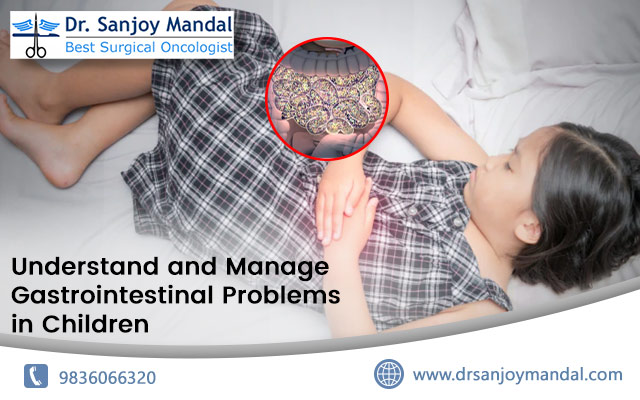Digestive problems in kids can affect their growth and make them feel uneasy. But how can they differentiate between a passing tummy trouble and a serious disorder? By understanding the symptoms in children, you can help your child get the right treatment. In this blog, a reputed gastrointestinal surgeon in Kolkata has talked about common digestive disorders in children and their effective management.
Common gastrointestinal problems in children
The following list talks about some of the common digestive problems that children suffer from:
Inflammatory bowel disease (IBD):
Around 10% of IBD cases are in kids under 18. IBD causes chronic digestive tract inflammation, leading to symptoms like diarrhoea, stomach pain, bloody stools, and nausea in children.
Getting a proper diagnosis is crucial, says gastrointestinal surgeon in Kolkata. Doctors may use blood tests and imaging to find the issue. Medication can help manage IBD symptoms, while serving nutrient-rich foods like bananas, whole-wheat pasta, and eggs is vital. During flare-ups, avoid nuts and seeds that can irritate the intestines.
Gastroesophageal Reflux Disease (GERD):
This condition results in stomach acid moving up into the oesophagus, leading to irritation and discomfort in infants. Typical signs include frequent spitting up, feeding difficulties, and fussiness during feeds. Additional symptoms comprise unusual arching, disrupted sleep, poor weight gain, and wet burps or hiccups.
To ease GERD symptoms in infants, avoid overfeeding. Keep your baby in an upright position for 30-60 minutes after meals. Avoid laying them flat, as this can quickly trigger GERD symptoms on a full stomach.
Lactose Intolerance:
Lactose intolerance occurs due to a deficiency in the enzyme lactase, which is needed to break down lactose in the small intestine. Without enough lactase, lactose remains unabsorbed, leading it to the large intestine, where it gets fermented, producing byproducts like carbon dioxide and hydrogen. These byproducts are the cause of digestive discomfort.
If your child has trouble digesting dairy, consider temporarily removing all milk-based products from their diet to assess their comfort. The positive news is that children with lactose intolerance might not need to exclude dairy permanently. Some individuals can tolerate small quantities of milk, ice cream, or cheese, especially when consumed alongside other foods. Another option is taking enzyme supplements like Lactaid tablets, on the recommendation of a GI surgeon in Kolkata.
Celiac Disease:
Celiac disease is an autoimmune condition where the body can’t digest gluten properly. When gluten-containing food is consumed, the immune system attacks the small intestine, damaging its lining and the tiny projections called villi. Without healthy villi, the small intestine can’t absorb nutrients effectively. Celiac disease is hereditary and can manifest at any age, even after years of consuming gluten.
Children with parents who have the condition are at a higher risk
Some of the symptoms of celiac disease include diarrhoea, vomiting, bloating, extreme fatigue, irritability, anaemia, etc. The only effective way to manage celiac disease is to consume a lifelong gluten-free diet. Foods that contain gluten, like noodles, breads, and pastries must also be avoided.
Eosinophilic Esophagitis:
Eosinophilic esophagitis is inflammation in the tube connecting the mouth and stomach (esophagus) due to an accumulation of white blood cells called eosinophils. This condition can result in challenges with swallowing, as well as discomfort, nausea, and vomiting.
Eosinophilic esophagitis is often linked to food allergies. To diagnose and manage it, your child’s doctor might suggest allergy testing and an elimination diet. During this diet, try to avoid potential irritants like milk, eggs, nuts, beef, wheat, fish, shellfish, corn, and soy from your child’s diet.
Gastrointestinal problems in children can be a source of discomfort and concern for young ones. If your child is suffering from one, visit a trusted gastrointestinal surgeon in Kolkata Dr Sanjoy Mandal today and give him/her a happy and healthy childhood.
